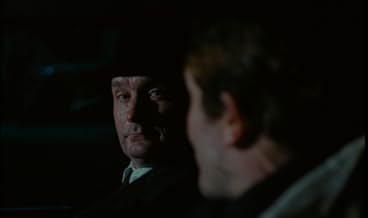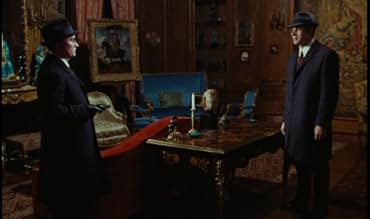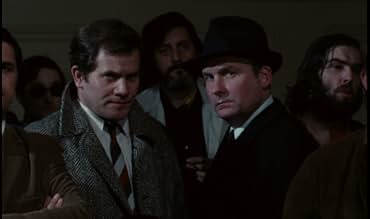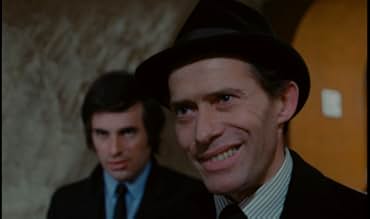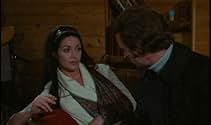Barnero est un flic amer qui travaille dans une ville qu'il considère pourrie.Barnero est un flic amer qui travaille dans une ville qu'il considère pourrie.Barnero est un flic amer qui travaille dans une ville qu'il considère pourrie.
- Réalisation
- Scénario
- Casting principal
Gianni Garko
- Dan Rover
- (as John Garko)
Anne Carrère
- Christine
- (as Anne Carrere)
Théo Sarapo
- Lupo
- (as Theo Sarapo)
Jean-Claude Bercq
- Germain
- (as Jean-Claude Berck)
Stéphan Holmes
- Le jeune garçon
- (as Stephan Holmes)
Avis à la une
This was a rather more than faithful adaptation of the Pierre Lesou's novel. A fierce story about two vengeance schemes involved one in the other. Two friends decide to avenge the death of one of their own and then kill a cop whose his friend decides to avenge him...Follow me? You have here one of best Michel Constantin's performances ever. Don't miss him facing Michel Bouquet. His lines are unforgettable. But something is missing, if you compare to the book. HOW DAN ROVEL'S CHARACTER GETS OUT OF JAIL?
No one seems to have noticed this detail.
Typical from Yves Boisset about the power of police, and the way cops sometimes can trespass the law. A true powerful film.
No one seems to have noticed this detail.
Typical from Yves Boisset about the power of police, and the way cops sometimes can trespass the law. A true powerful film.
Yves Boisset's "Un condé" (from the French slang for cop) is a sort of Gallic "Dirty Harry", a police thriller that raises awkward questions about how far across the line the good guys can step in order to clear up society's mess. Inspector Favenin (Michel Bouquet) undoubtedly goes too far. When his idealistic but ineffectual partner is killed pursuing the culprits of a gang revenge attack (a pursuit instigated by Favenin himself), the embittered cop, realising that conventional police methods won't work, takes matters into his own hands.
At first, it's hard to resist cheering as he takes on the worst of the gang thugs using their own methods. But when his ruthless pursuit for revenge starts to impinge on the more sympathetic characters in the story, including an essentially decent man who gets beaten up in front of his young son, we are forced to question where our sympathies lie.
Boisset's functional, low-key direction, while lacking the stylistic flamboyance of Melville, serves the story well, and makes the frequent outbursts of violence all the more shocking. Bouquet is well-cast as the soft-spoken, solitary, buttoned-up and near-psychopathic Favenin, a more complex (and scarier because unpredictable) character than Eastwood's Harry Callahan. Whereas in "Dirty Harry" the hero's methods are questionable but his goals are morally correct, Favenin clearly has more personal motives that are not necessarily consistent with the public good. Even so, his pragmatic boss is willing to overlook his actions provided they can be covered up.
In a minor role, Michel Constantin, a stalwart of many French gangster movies, gives one of his best performances here as a fatalistic hired gun; his confrontation with Favenin is a highlight of the film.
At first, it's hard to resist cheering as he takes on the worst of the gang thugs using their own methods. But when his ruthless pursuit for revenge starts to impinge on the more sympathetic characters in the story, including an essentially decent man who gets beaten up in front of his young son, we are forced to question where our sympathies lie.
Boisset's functional, low-key direction, while lacking the stylistic flamboyance of Melville, serves the story well, and makes the frequent outbursts of violence all the more shocking. Bouquet is well-cast as the soft-spoken, solitary, buttoned-up and near-psychopathic Favenin, a more complex (and scarier because unpredictable) character than Eastwood's Harry Callahan. Whereas in "Dirty Harry" the hero's methods are questionable but his goals are morally correct, Favenin clearly has more personal motives that are not necessarily consistent with the public good. Even so, his pragmatic boss is willing to overlook his actions provided they can be covered up.
In a minor role, Michel Constantin, a stalwart of many French gangster movies, gives one of his best performances here as a fatalistic hired gun; his confrontation with Favenin is a highlight of the film.
Tough-as-Cop thriller from a clearly not-so-belle France, moodily shot with a real flair for coolly capturing callous street justice by, Yves Boisset, whose terse, muscular mise-en-scène translates excitingly into a remarkably grim, morbidly fascinating French crime thriller. The legendary French actor, Michel Bouquet is genuinely chilling as the flinty L'inspecteur Favenin whose amoral and increasingly brutal journey to avenge the fruitless death of a fellow officer leads him ever deeper into a violent existential nightmare!
'Un condé' (1970) is a magnificently bleak, profoundly philosophical Gallic Euro-crime which works brilliantly as a savage expose of police barbarity, dealing unflinchingly with the ultimate societal conundrum; must one become like the beasts in order to deal with the beast? The only thing that marred my enjoyment of this wickedly immersive Gallic crime treat is that the source VHS print of my bootleg was a trifle muddy. An immaculately restored, UK-friendly, bells & whistles DVD/Blu-ray edition of this exquisitely cold example of gripping, abyssal dark 70s French policier is LONG overdue!
'Un condé' (1970) is a magnificently bleak, profoundly philosophical Gallic Euro-crime which works brilliantly as a savage expose of police barbarity, dealing unflinchingly with the ultimate societal conundrum; must one become like the beasts in order to deal with the beast? The only thing that marred my enjoyment of this wickedly immersive Gallic crime treat is that the source VHS print of my bootleg was a trifle muddy. An immaculately restored, UK-friendly, bells & whistles DVD/Blu-ray edition of this exquisitely cold example of gripping, abyssal dark 70s French policier is LONG overdue!
Yves Boisset is a very special director, he has made many good films, most importantly, in my opinion, "The Assassination" (1972), with the great Gian Maria Volontè and many other exceptional actors, and "Dog Day"(1984) , with the unparalleled Lee Marvin. In "The Assassination", as a corrupt lawyer, we find the extraordinary Michel Bouquet, who here, in "The Cop", he is the cop, a policeman like you have not seen in other movies, a cop with an original philosophy, kindred somehow, with Clint Eastwood's Dirty Harry. But different! Michel Bouquet is an actor who does not need too many specific means or too many replicas to create memorable characters, Michel Bouquet is an absolute force, only by the way he looks, moves and breathes. Likewise, but in another register, it is Michel Constantin, who also plays a smaller role, but, as usual, natural, impeccable. Françoise Fabian is beautiful and natural. Probably the best part of Gianni Garko. So, Bernard Fresson. Adolfo Celi, a small role too but, as usual, very effective. Rufus, Théo Sarapo, Henri Garcin, Pierre Massimi, the same, very good. Need absolutely to be seen!
The basic motif to see it remains the admirable job of Michel Bouquet. A film about friendship, duty and corruption , simple, precise and using cold tones.
A cop is killed.
His colegue looks for the murderer, using all tools for find him.
Nothing new but seductive for the cinematography and for the wise way to use American model, giving to it profound nuances.
A film about guilty, to.
Interesting for the exploration of characters.
A cop is killed.
His colegue looks for the murderer, using all tools for find him.
Nothing new but seductive for the cinematography and for the wise way to use American model, giving to it profound nuances.
A film about guilty, to.
Interesting for the exploration of characters.
Le saviez-vous
- AnecdotesAlthough his film is close to Pierre Lesou's novel, director Yves Boisset confessed that, during the scene between Michel Constantin and Michel Bouquet, he was influenced by Jean-Pierre Melville's films' atmosphere and dialogue.
- Versions alternativesDue to pressure from then French Minister of the Interior Raymond Marcellin, the film had a tough time getting approved for release and director Yves Boisset was finally forced to cut a few lines of dialogue and reshoot the interrogation scene. The film was shown uncut and with the original scene internationally. In France, the original scene can be seen as a bonus feature on home video.
- ConnexionsReferenced in Parole de cinéaste: Yves Boisset: le cinéaste le plus censuré de France (2013)
Meilleurs choix
Connectez-vous pour évaluer et suivre la liste de favoris afin de recevoir des recommandations personnalisées
Détails
- Date de sortie
- Pays d’origine
- Langues
- Aussi connu sous le nom de
- Le Condé
- Lieux de tournage
- Fourges, Vexin-sur-Epte, Eure, France(ending scene at the water mill)
- Sociétés de production
- Voir plus de crédits d'entreprise sur IMDbPro
- Durée
- 1h 35min(95 min)
- Mixage
- Rapport de forme
- 1.66 : 1
Contribuer à cette page
Suggérer une modification ou ajouter du contenu manquant

